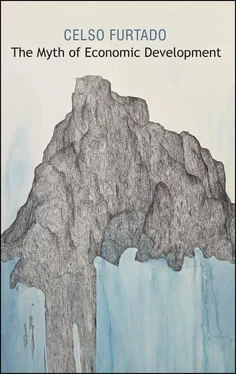1 Series title Series title Critical South The publication of this series is supported by the International Consortium of Critical Theory Programs funded by the Andrew W. Mellon Foundation. Series editors: Natalia Brizuela and Leticia Sabsay Leonor Arfuch, Memory and Autobiography Aimé Césaire, Resolutely Black Silvia Rivera Cusicanqui, Ch’ixinakax Utxiwa Bolívar Echeverría, Modernity and “Whiteness” Celso Furtado, The Myth of Economic Development Eduardo Grüner, The Haitian Revolution María Pia López, Not One Less Pablo Oyarzun, Doing Justice Néstor Perlongher, Plebeian Prose Nelly Richard, Eruptions of Memory Tendayi Sithole, The Black Register
2 Title page The Myth of Economic Development Celso Furtado Translated by Jordan B. Jones polity
3 Copyright page Copyright page Originally published in Portuguese as O mito do desenvolvimento econômico © André Tosi Furtado and Mario Tosi Furtado This English edition © 2020 by Polity Press Polity Press 65 Bridge Street Cambridge CB2 1UR, UK Polity Press 101 Station Landing Suite 300 Medford, MA 02155, USA All rights reserved. Except for the quotation of short passages for the purpose of criticism and review, no part of this publication may be reproduced, stored in a retrieval system or transmitted, in any form or by any means, electronic, mechanical, photocopying, recording or otherwise, without the prior permission of the publisher. ISBN-13: 978-1-5095-4013-6 ISBN-13: 978-1-5095-4014-3 (paperback) Cover image: Sandra Cinto Untitled (from the series By Chance and Necessity) (detail) 2015 Permanent pen and acrylic on canvas 78 3/4 x 59 inches; 198.1 x 149.9 cm Courtesy the artist and Tanya Bonakdar Gallery, New York / Los Angeles A catalogue record for this book is available from the British Library. Typeset in 10.5 on 12.5pt Sabon by Fakenham Prepress Solutions, Fakenham, Norfolk NR21 8NL Printed and bound in Great Britain by TJ International Limited The publisher has used its best endeavours to ensure that the URLs for external websites referred to in this book are correct and active at the time of going to press. However, the publisher has no responsibility for the websites and can make no guarantee that a site will remain live or that the content is or will remain appropriate. Every effort has been made to trace all copyright holders, but if any have been overlooked the publisher will be pleased to include any necessary credits in any subsequent reprint or edition. For further information on Polity, visit our website: politybooks.com
4 Introduction – Ndongo Samba Sylla
Limits to Growth
A structuralist reading of LTG
An enduring myth
References
5 1 The Prophecy of Collapse
Notes
6 2 The Structural Evolution of the Capitalist System
Notes
7 3 Large Companies in New Center–Periphery Relations
Notes
8 4 Options for Peripheral Countries
Notes
9 5 The Myth of Economic Development
10 Index
11 End User License Agreement
1 Cover
2 Contents
3 1 The Prophecy of Collapse
1 ii
2 iii
3 iv
4 vi
5 vii
6 viii
7 ix
8 x
9 xi
10 xii
11 xiii
12 xiv
13 xv
14 xvi
15 xvii
16 xviii
17 xix
18 xx
19 xxi
20 xxii
21 xxiii
22 xxiv
23 xxv
24 xxvi
25 xxvii
26 xxviii
27 xxix
28 xxx
29 1
30 2
31 3
32 4
33 5
34 6
35 64
36 65
37 66
38 7
39 8
40 9
41 10
42 11
43 12
44 13
45 14
46 15
47 16
48 17
49 18
50 19
51 20
52 21
53 22
54 23
55 24
56 25
57 26
58 27
59 67
60 68
61 69
62 70
63 71
64 28
65 29
66 30
67 31
68 32
69 33
70 34
71 35
72 36
73 37
74 38
75 39
76 40
77 41
78 42
79 43
80 44
81 45
82 72
83 46
84 47
85 48
86 49
87 50
88 51
89 52
90 53
91 54
92 73
93 55
94 56
95 57
96 58
97 59
98 60
99 61
100 62
101 63
102 74
103 75
104 76
105 77
106 78
107 79
Series title
Critical South
The publication of this series is supported by the International Consortium of Critical Theory Programs funded by the Andrew W. Mellon Foundation.
Series editors: Natalia Brizuela and Leticia Sabsay
Leonor Arfuch, Memory and Autobiography
Aimé Césaire, Resolutely Black
Silvia Rivera Cusicanqui, Ch’ixinakax Utxiwa
Bolívar Echeverría, Modernity and “Whiteness”
Celso Furtado, The Myth of Economic Development
Eduardo Grüner, The Haitian Revolution
María Pia López, Not One Less
Pablo Oyarzun, Doing Justice
Néstor Perlongher, Plebeian Prose
Nelly Richard, Eruptions of Memory
Tendayi Sithole, The Black Register
The Myth of Economic Development
Celso Furtado
Translated by Jordan B. Jones
polity
Originally published in Portuguese as O mito do desenvolvimento econômico © André Tosi Furtado and Mario Tosi Furtado
This English edition © 2020 by Polity Press
Polity Press
65 Bridge Street
Cambridge CB2 1UR, UK
Polity Press
101 Station Landing
Suite 300
Medford, MA 02155, USA
All rights reserved. Except for the quotation of short passages for the purpose of criticism and review, no part of this publication may be reproduced, stored in a retrieval system or transmitted, in any form or by any means, electronic, mechanical, photocopying, recording or otherwise, without the prior permission of the publisher.
ISBN-13: 978-1-5095-4013-6
ISBN-13: 978-1-5095-4014-3 (paperback)
Cover image:
Sandra Cinto
Untitled (from the series By Chance and Necessity) (detail)
2015
Permanent pen and acrylic on canvas
78 3/4 x 59 inches; 198.1 x 149.9 cm
Courtesy the artist and Tanya Bonakdar Gallery, New York / Los Angeles
A catalogue record for this book is available from the British Library.
Typeset in 10.5 on 12.5pt Sabon
by Fakenham Prepress Solutions, Fakenham, Norfolk NR21 8NL
Printed and bound in Great Britain by TJ International Limited
The publisher has used its best endeavours to ensure that the URLs for external websites referred to in this book are correct and active at the time of going to press. However, the publisher has no responsibility for the websites and can make no guarantee that a site will remain live or that the content is or will remain appropriate.
Every effort has been made to trace all copyright holders, but if any have been overlooked the publisher will be pleased to include any necessary credits in any subsequent reprint or edition.
For further information on Polity, visit our website: politybooks.com
Конец ознакомительного фрагмента.
Текст предоставлен ООО «ЛитРес».
Прочитайте эту книгу целиком, на ЛитРес.
Безопасно оплатить книгу можно банковской картой Visa, MasterCard, Maestro, со счета мобильного телефона, с платежного терминала, в салоне МТС или Связной, через PayPal, WebMoney, Яндекс.Деньги, QIWI Кошелек, бонусными картами или другим удобным Вам способом.












